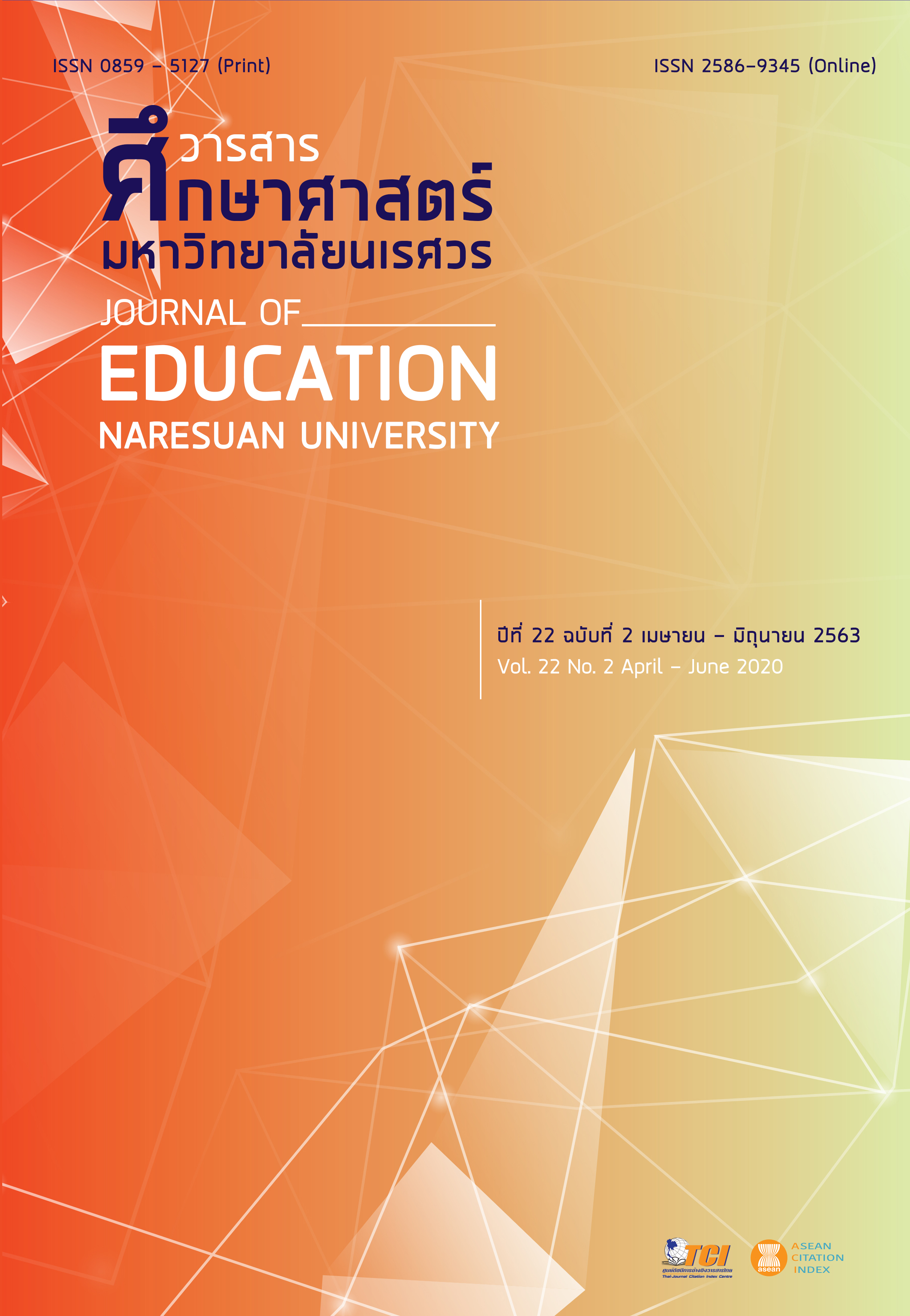DEVELOPMENT FLIPPED CLASSROOM INSTRUCTIONAL PACKAGE WITH FLEXIBLE LEARNING TO PROMOTE INFORMATION AND COMMUNICATION TECHNOLOGY SKILLS FOR UNDERGRADUATE
Main Article Content
Abstract
The aim of this study: 1) to compare learning achievement of students using the flipped classroom instructional package with flexible learning to promote information and communication technology skills, 2) to evaluate the information and communication technology skills of the students learning from the flipped classroom instructional package with flexible learning, and 3) to study the satisfaction level of learners using the flipped classroom instructional package with flexible learning to promote information and communication technology skills. The samples used in this study were 50 undergraduate students of Naresuan University, enrolling in the the Computer Information Science course, during the third semester of 2016 academic year. They were assigned into eight groups by simple random sampling. Using the group as a unit in the one group. The following instruments were used in this study: 1) instructional package on Computer Information Science course, 2) a learning achievement test, 3) an evaluation form on ICT skills, and 4) an evaluation form on students' satisfaction with the flipped classroom instructional package with flexible learning to promote information and communication technology skills. The study revealed the following results: 1) the achievement of students in the Computer Information Science course, after learning was higher than before learning at 0.5 level of statistical significance, 2) the scores of ICT skills was at a high level, and 3) students were satisfied with the activities of Flipped Classroom instructional package with flexible learning to promote information and communication technology skills at a high level ( = 4.29, S.D. = 0.32)
Article Details
The owner of the article does not copy or violate any of its copyright. If any copyright infringement occurs or prosecution, in any case, the Editorial Board is not involved in all the rights to the owner of the article to be performed.
References
Bergmann, J., & Sams, A. (2012). Flip your classroom reach every student in every class every day. United States of America: ISTE and ASCD.
Brahmawong, C. (2002). Educational technology teaching unit 1-5. Bangkok: Office of Educational Technology Sukhothai Thammathirat Open University. [in Thai]
Brahmawong, C. (2013). Developmental testing of media and instructional package. Silpakorn Educational Research Journal, 5(1), 7-20. [in Thai]
Brande, L. V. D. (1993). Flexible and distance learning. Chichester: John Wiley and Sons.
Cheaha, P. (2010). Activity package. Retrieved January 12, 2016, from http://da-activities.blogspot.com/ p/blog-page_7543.html. [in Thai]
Kuchonthara, P., et al. (2014). Evaluate the effectiveness of blended learning and flexible learning model to promote lifelong learning for working-age adult. VRU Research and Development Journal, 9(1), 55-63. [in Thai]
Manyum, W., & Sittiwong, T. (2014). The management of learning based on QSCCS with social media to enhance the capacity for learning in the 21st century. Journal of Education, Silpakorn University, 11(1,2), 101-110. [in Thai]
Maprik, J., Klin-eam, C., & Parnichparinchai, T. (2015). The development of inductive learning activities packages on logarithmic function for Matthayomsuksa V students. Journal of Education Naresuan University, 16(4), 137-145. [in Thai]
Ministry of Education. (2009). The basic education core curriculum B.E. 2551 (A.D. 2008). Bangkok: The Agricultural Cooperative Federation of Thailand. [in Thai]
Morrasi, C. (2013). Alternative: Learning achievements from the backward design instruction and flipped classroom on social network for the course in problem analysis and solution for grade 5 students (Master thesis). Bangkok: King Mongkut's University of Technology Thonburi. [in Thai]
Panich, V. (2013). Teachers for students to create a Flipped Classroom (2nd ed.). Bangkok: S.R. Printing Mass Products. [in Thai]
Sakulprahmne, S., & Prasertsaruay, S. (2015). Development of flexible learning model for the undergraduate students. VRU Research and Development Journal, 10(1), 27-35. [in Thai]
Sanchaitorn, K. (2015). Logistics and supply chain management. Khon Kaen: Khon Kaen University Printing. [in Thai]
Sangthong, S. (2013). The development of learning activity package in conic section through team-game-tournament teaching technique and the geometer's sketchpad program for Mathayomsuksa IV student (Master thesis). Phitsanulok: Naresuan University. [in Thai]
Sinlarat, P. (2007). General education curriculum: Principles and procedures (3rd ed.). Bangkok: Chulalongkorn University Press. [in Thai]
Sintapanon, S. (2010). Learning management innovation for youth life skills (4th ed.). Bangkok: 9119 Technic Printing. [in Thai]
Suttirat, C. (2013). Development of theory. Bangkok: V Print (1999) Printing House. [in Thai]
Thaikam, W., Parnichparinchai, T., & Klin-eam, C. (2015). The development of the learning activities packages by using Polya’s problem solving techniques and problem solving strategies to enhance the students’ abilities which are focused on mathematical problem-solving skills with English situation for Mattayomsuksa I students science and mathematics English program (SMEP). Journal of Education Naresuan University, 17(3), 129-137. [in Thai]
Tongpitak, N., Piromjitpong, S., & Asawapoom, S. (2016). The development of flexible learning model for Rajabhat undergraduate students in Lower Northeastern Region. Veridian E-Journal, Silpakorn University, 9(3), 527-542. [in Thai]
Wongyai, W. (1982). Curriculum development and new to teaching (2nd ed.). Bangkok: Rungruang Tham. [in Thai]


